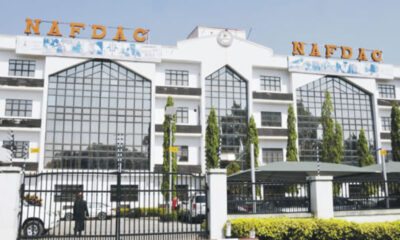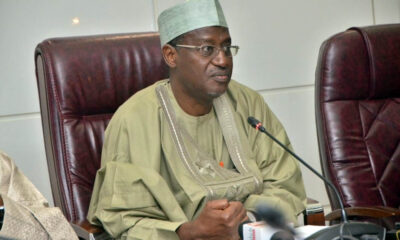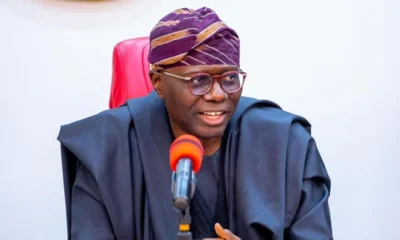Business
UK okays more foreign investments for Lagos

- Firm set to build waste-to-energy plant
By Dada Jackson
The British government has given a seal of approval for more foreign investments in Lagos State, as plans get underway for the take off of the first waste-to-energy plant in the state.
The Deputy British High Commissioner in Nigeria, Mr Ben Jones, gave the official nod when he spoke at Igando refuse dumpsite after a guided tour of facilities of West African ENRG alongside state officials led by the Commissioner for the Environment and Water Resources, Tunji Bello.
His words: “Though some people think about Nigeria and investments and look the other way, we say ‘look this way’. We will help you and it is a real opportunity here, as it is being demonstrated today, and even opportunities to grow beyond even what is being achieved now, which is so fantastic”.
“It is absolutely outstanding what is being achieved using British technology, finance and real great Nigerian drive and expertise to create something special that is really going to grow and grow.”
The diplomat reiterated that so many issues of climate change, challenge of pollution, challenge of drainage and of plastics getting into the drains propped up at the site but are being solved by the West African ENRG waste conversion facility.
Commissioner for the Environment and Water Resources Tunji Bello while welcoming the team said the quest of West African ENRG to move from waste to wealth to establishing the first waste to energy facility spoke volume about the conducive business atmosphere in Lagos.
Bello who was with the Perm Sec, Environmental Services, Mrs Belinda Odeneye, and LAWMA MD, Ibrahim Odumboni, said West African ENRG came to Lagos in 2014, had its waste conversion plant unveiled by Babatunde Fashola as Lagos governor in 2015, saying the company now planned to set up a waste to energy plant.
“There were some intervals of difficulties that we have now successfully overcome. Now, we have been able to restore all that they started with. They have also improved on a lot of things. You must have observed during the inspection today a lot of conversion processes from waste to plastics, rubber, cans and bottles,” Bello stated.
The commissioner said from the brief and visual clips on the proposed waste to energy project presented by West African ENRG, it was clear that if the organisation had more enablement, it would make further progress in waste conversion.
“Lagos has always been a Mecca of investments. What we just need to do is to make sure that infrastructural developments are accelerated and substantial progress is being made in that regard. We have the roads, water and other infrastructural facilities ready,” he said.
While taking the guests round, the CEO West African ENRG, Paul O’Callaghan, said his organisation planned to invest about 125 to 150 million dollars to build a 25 megawatts waste to energy facility that would process 2.5 tonnes of waste daily.
“At the moment, it takes 3 to 4 hours in the dry season to tip waste at the open landfill site to the wet season that takes as much as 24 hours depending on the weather. We are committing to under 30mins and aiming for 15 minutes turnaround time,” Paul said.
He said the new project meant the PSP would move from houses to the waste to energy facility and within 15 minutes would be back on the streets collecting waste, thus creating better economy for the PSP and a quicker and cleaner Lagos.
Mr O’Callaghan who was with the COO, Lolade Oresanwo, expressed readiness to convert Olusosun dumpsite to a waste to energy facility that would be built to British standard in terms of emission control if closed down, adding that it would take approximately 20 months to complete after groundbreaking.
Managing Director of LAWMA, Ibrahim Odumboni, who was part of the team, expressed confidence with what he had seen there was the capacity to cope with the level of recyclables to be generated from the society while sorting from source.
“For me, this is an encouragement for us to give them an enabling environment to do something similar around here and other parts of Lagos so that we can bring development and prosperity to circular economy within the state,” he said.
Business
We will sell fuel at N935/litre from today – IPMAN

We will sell fuel at N935/litre from today – IPMAN
The Independent Petroleum Marketers Association of Nigeria (IPMAN) has announced that the price of petrol will drop to N935 per litre by Monday, following a new arrangement by Dangote Refinery.
Newstrends reports that Dangote Refinery recently slashed its fuel price by 7.27 per cent, reducing it from N970 per litre to N899.50k per litre for oil marketers.
IPMAN attributed the price reduction to a decrease in Dangote Refinery’s fuel ex-depot price and a uniform pricing structure, which will enable marketers nationwide to sell at the new rate.
Alhaji Maigandi Garima, IPMAN’s National President, disclosed the development during an interview with the News Agency of Nigeria (NAN) in Abuja on Sunday. He commended Dangote Refinery for the initiative, describing it as a timely intervention.
He said, “Dangote refinery has brought another new arrangement of loading and pricing by which marketers would pay a fixed ex-depot price of N899.50.
READ ALSO:
- Syria new leader says all weapons to come under state control
- Cyclone kills 94, over 700 injured in Mozambique, Malawi, Zimbabwe
- Why we displayed ‘Jesus Christ is not God’ banner at Lekki mosque -Imam
“The refinery is running a programme whereby it wants the fuel consumption across the country to be at the same rate. We are expecting the new arrangement to kick-start on Monday.
“We have been loading from the Dangote refinery and the refinery is saving us in this festive period.”
He added that the new arrangement reflects a significant drop from the previous ex-depot price of N970 per litre at Dangote Refinery.
Garima noted that deregulation of the downstream sector has fostered healthy competition, paving the way for a steady decline in fuel prices.
“That is the reason why we have been asking the government to allow private sectors to participate in the refinery business.
“Very soon, more refineries are coming up and the country will see a lot of price reduction in the downstream sector,’’ he added.
Reflecting on the 2023 yuletide period, Garima recalled that petrol was sold at N2,000 per litre in parts of the Northern and Eastern regions due to reliance on imported fuel.
He noted that prices in those areas are now capped at N1,100 per litre due to the functioning refineries in the country.
We will sell fuel at N935/litre from today – IPMAN
Railway
Lagos Rail Mass Transit part of FG free train ride – NRC

Lagos Rail Mass Transit part of FG free train ride – NRC
The Nigerian Railway Corporation (NRC) has disclosed that the Lagos Rail Mass Transit (LRMT) trains are included in the Federal Government’s free train ride initiative for the Christmas and New Year celebrations.
The LRMT, which currently includes the Phase 1 Blue Line Rail and the Phase 1 of the Red Line Rail, operates under the Lagos Metropolitan Area Transport Authority (LAMATA).
This announcement was made by Ben Iloanusi, the Acting Managing Director of the NRC, during an interview on NTA News TV on Friday, following the launch of the initiative earlier that day.
While Iloanusi stated that Phase 1 of both the Blue Line and Red Line Rail projects are part of the program, LAMATA has yet to confirm this inclusion.
READ ALSO:
- Nigeria denies alleged plot to destabilise Niger Republic
- Navy arrests 19 Nigerians attempting to reach Europe by hiding on ship
- Troops arrest four Ambazonian rebels in Taraba
Iloanusi outlined the other routes benefiting from the scheme, which include the Lagos-Ibadan Train Service, Kaduna-Abuja Train Service, Warri-Itakpe Train Service, Port Harcourt-Aba Train Service, and the Bola Ahmed Tinubu Mass Transit in Lagos. Notably, little was previously known about the Bola Ahmed Tinubu Mass Transit service until this disclosure.
“Let me mention the routes where this free train service is happening. We have the Lagos-Ibadan Train Service, we have the Kaduna-Abuja Train Service, we have the Warri-Itakpe Train Service, we have the Lagos Rail Mass Transit trains, we have the Port Harcourt-Aba Train Service, and we have what we call the Bola Ahmed Tinubu Mass Transit, which is also in Lagos,” he stated.
Iloanusi provided operational updates, stating that passengers nationwide can access free tickets online or, for those unable to do so, at train stations where they will be profiled and validated.
He noted that passengers using NRC-managed services (excluding the Lagos Rail Mass Transit) should reserve tickets via the official website, www.nrc.gov.ng, with a valid ID required. He also advised travelers to plan, arrive on time, and bring valid identification.
Lagos Rail Mass Transit part of FG free train ride – NRC
Business
NNPC denies claim of Port Harcourt refinery shutdown

NNPC denies claim of Port Harcourt refinery shutdown
The Nigerian National Petroleum Company Limited (NNPCL) has denied claims in media reports that the newly refurbished Port Harcourt refinery has shut down.
The national oil company denied the claim in a press release issued by its Chief Corporate Communications Officer, Olufemi Soneye, on Saturday.
Soneye said the claim was false and urged Nigerians to disregard it. He stressed that the Port-Harcourt Refinery is fully operational.
READ ALSO:
- Like Ibadan, stampede claim 10 lives for Abuja Catholic church, 17 in Anambra
- Marketers react after NNPCL slashes petrol price to N899 per litre
- Electricity: We installed 184,507 meters, issued 50 licences in Q3, says FG
The statement read, “The attention of the Nigerian National Petroleum Company Limited (NNPC Ltd.) has been drawn to reports in a section of the media alleging that the Old Port Harcourt Refinery which was re-streamed two months ago has been shut down.
“We wish to clarify that such reports are totally false as the refinery is fully operational as verified a few days ago by former Group Managing Directors of NNPC.”
He noted that preparation for the day’s loading operation is currently ongoing, and added that claims of the shutdown are “figments of the imagination of those who want to create artificial scarcity and rip-off Nigerians.”
NNPC denies claim of Port Harcourt refinery shutdown
-

 Railway2 days ago
Railway2 days agoLagos Rail Mass Transit part of FG free train ride – NRC
-

 metro21 hours ago
metro21 hours agoWhy we displayed ‘Jesus Christ is not God’ banner at Lekki mosque -Imam
-

 metro3 days ago
metro3 days agoCourt stops customs from seizing imported rice in open market
-

 metro2 days ago
metro2 days agoIbadan stampede: Ooni reacts after arrest of ex-wife
-

 metro3 days ago
metro3 days agoAfe Babalola: Court grants Dele Farotimi bail, barred from media interviews
-

 metro2 days ago
metro2 days agoNIMC warns against extortion, reaffirms free NIN enrollment
-

 metro3 days ago
metro3 days agoNAFDAC seizes N5bn fake rice, seals factory in Nasarawa
-

 metro2 days ago
metro2 days agoLike Ibadan, stampede claims 10 lives for Abuja Catholic church, 17 in Anambra














You must be logged in to post a comment Login